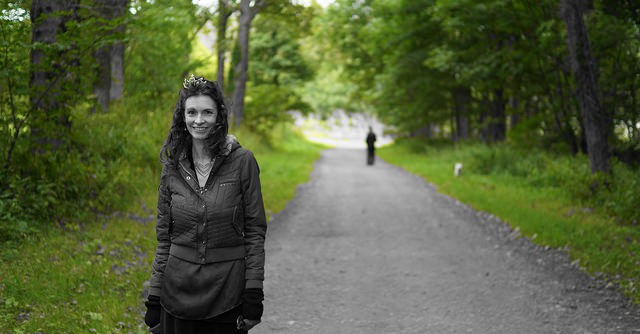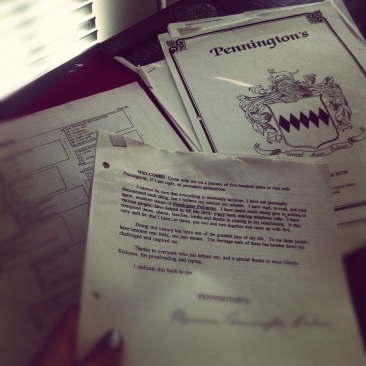
Begin the Buggane! Artwork by Graham Richards
Graham wrote this week’s audio essay, and his darling mother, Janet Richards was kind enough to lend her authentic Manx charm. Please enjoy this original faery tale — it is the perfect bedtime story! If you would like to learn more about our enhanced eBook, Uncle Ogre and Great Aunt Ghost, please visit our Kickstarter campaign and listen to our first audio essay, Tom Fool and the Ill-Fated Lovers. Thank you for listening, sharing, and enabling our wild imaginations.
Feena Quayle & the Buggane
Narrated by Janet Richards
Written, produced, and with music by Graham Richards
A reader’s guide to Manx vocabulary :
Buggane – a type of ogre native to the Island
Bonnag – Manx cake
Them Ones, Themselves – the fairy folk
Once lived an old woman in Laxey called Feena Quayle, and there wasn’t a word goin’ a-speakin against her in all. Her cooking was the bes’ in all the Island, and all were in agreement about that!
Well Old Feena Quayle kept her garden in and about the house, and some said it was magic, even tended by Themselves.
On her way to Doolish one day for market, she passed her neighbor Ned Faragher, a miller to his trade. “What’s doin’ on ya, Feena?” asked Ned.
“Off to market I am, “ replied Feena. “And how’s the world usin’ you, Masthar?”
“Fair to middlin,” said Ned, “Fair to middlin. But tis a rumor goin’ that the auld Buggane from Snaefel is off and about and stirrin’ up trouble, tramplin’ gardens and puffin’ smook down folks chimleys.”
“Let me catch him at his tricks and I’ll larn him, the great brute” said Feena.
“Deed, and do ya say so?”
“Aye, but sooner he pass my house clean by, oh the neck of him!” said Feena.
That night soon after bed, Mr. Faragher opened his eyes and saw the great vicious Buggane in his yard digging up turnips for dinner. The beast was covered with a thick black mane, it had two great tusks, and its eyes were the color of burning torches. The Buggane saw he had been spotted and roared towards Mr. Faragher, who screamed and begged for his life.
“Don’t eat me, Mr. Buggane, sir, and I’ll show thee round a house with better turnips than you’d ever had.”
The Buggane agreed, and Mr. Faragher, under cover of darkness, showed the beastie to Feena Quayle’s garden.
“Off with ya, then,” said the Buggane, and Mr. Faragher ran home full fetch with his torchlight out in front of him.
In the morning old Feena Quayle came out of her house to see her garden trodden upon and her prize turnips eaten. She shouted into the mist, “Who’s eaten my turnips?! I’ll be up with him for that!”
And with that, she tromped off to the kitchen and began cooking. She baked and baked all day long and at the end of the day she had five big lovely bonnags, each the size of a wagon wheel. All of them but one were full of currants and dried fruit and spices and sugar and were delicious as could be.
All of them but one. This last bonnag did not have currants and fruit; rather it contained herringbones and pepper. And there were no spices but instead rotten eggs, and instead of sugar it was salt.
Each night Feena left a bonnag in her garden by her trodden turnips, careful to place it far away from the creme and honey she routinely left out for Them Ones. And each morning, the bonnag was gone, stolen by the Buggane. On the fifth night, she left out the rotten, peppery, salt-laden bonnag and lay cute peeping out her window watching for the villain to arrive.
An hour after dark the Buggane arrived with his belly rumbling and his big red eyes gleaming out of the darkness. He chuckled to himself, “I’ve put a sight on that old woman’s bonnag, and there’s nothing she can do about it!” And with that he scooped up the giant bonnag and bit it in half.
Steam began to come out of the great beast’s ears, and tears began streaming down his cheeks. The herring bones got wedged between his great fangs and he yowled in surprise. The pepper made him sneeze and cough and his great tongue swelled up twice its size. The stench of the rotten eggs overwhelmed him and the salt pickled his cheeks, and he just didn’t know what to do but stomp and tramp around and huff and puff in misery.
“Lesson larned, then Beastie!” cackled Feena, “Good shuttance, and the back of my hand to ya!” And the Buggane raced away in search of relief.
Word spread of how Old Feena Quayle tricked the Buggane, and the tale is still told between folks at the Shore Hotel when there is a drop between them. But to the last of it, Ned Faragher never enjoyed Old Feena Quayle’s cooking again, for she looked at him with too much knowledge in her eyes and in her wry smile. Poor Ned was always afraid of what he may find in his dinner, and if it’s a lie I’ve told then it’s a lie I’ve heard.





